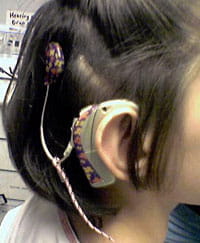What to Expect at Your First Appointment with the Cochlear Implant Program
When we see your child for the first time, our primary purpose is to determine what treatments could help your child’s hearing. We accomplish this by performing a wide variety of tests, including several audiologic tests. We also may perform imaging tests—such as computed tomography (CT) or magnetic resonance imaging (MRI)—of your child’s inner ear.
If we determine that cochlear implants could greatly help your child’s hearing, we will have several different specialized team members evaluate your child. Their purpose is to decide what factors we need to address in your child’s care plan.
Making an Appointment with the Cochlear Implant Program
Visit your audiologist, otolaryngologist, pediatrician or other healthcare professional who manages your child’s hearing loss. That professional can refer your child for a cochlear implant evaluation. Ask your child’s physician to fill out this referral form and send it to us. These details will help us better evaluate your child’s cochlear implant options.
Once we receive the referral, we’ll reach out to obtain additional information from you and your child’s school or early intervention providers. The CI Team will meet to review the information and determine which evaluations are appropriate. Those evaluations may include visits with audiology, speech, ENT, DDBP and social work. The team coordinator will contact you to find the best appointment times and schedule these for you.
On the Day of Your Visit to the Cochlear Implant Program
Arriving At Your Appointment
You will need to arrive about 30 minutes before your child’s appointment. This will allow 15 minutes to park and walk to our clinic, and 15 minutes to check in at our registration desk. The specialists on the cochlear implant team see patients at a variety of locations. Please refer to the evaluation itinerary provided for the order and location of your child’s appointments with cochlear implant team.
If you are running late, please contact us.
At Your Appointment
At this first appointment, we will perform many different tests to determine whether your child could benefit from a cochlear implant. Depending on the number of tests we perform and the different specialists who evaluate your child, this visit could take three to six hours.
After Your Visit to the Cochlear Implant Program
You will receive an “After Visit Summary” at the end of your appointment. It will include important details about any upcoming appointments. It also will include contact information for your child’s care team.
Upon completion of evaluations, the CI Team will meet to discuss their findings and determine if your child would benefit from a cochlear implant. A member of the team will reach out to you to discuss the team’s recommendations.




